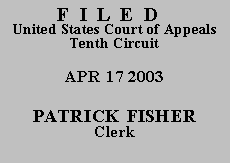

| ROBERT J. O'CONNOR,
Plaintiff - Appellant,
v.
UNITED STATES OF AMERICA;
SENATE, House of Representatives;
GEORGE W. BUSH, JR., President Defendants - Appellees. |
No. 02-2286
(D.C. No. CIV-02-1160-BB/LCS) |
Liberally construing Mr. O'Connor's complaint under Haines v. Kerner, 404 U.S. 519, 520 (1972), it appears he attacks the district court's decision on the grounds that the court does in fact have the power to declare the presidential election process unconstitutional, and that the court erred by misapplying constitutional law. He challenges the constitutionality of several aspects of the election process including the use of the popular vote, the involvement of political parties and money in the electoral college, and the process as a whole. Mr. O'Connor maintains that the Constitution has thereby been effectively amended without due process of law. He renews his arguments before this court and asks us to declare the present method of selecting the president unconstitutional and to remove President Bush from office.
28 U.S.C. § 1915(e)(2)(B) confers discretion on a district court to dismiss an in forma pauperis action if it is frivolous or fails to state a claim on which relief may be granted. The discretion granted to district courts to screen out meritless causes serves as the surrogate for the constraint that financial considerations provide in the realm of paid cases. See Neitzke v. Williams, 490 U.S. 319, 328 (1989). The district court did not specify whether it deemed Mr. O'Connor's claim to be frivolous or whether it failed to state a claim on which relief could be granted. Although our standards of review are different for these two situations, see Denton v. Hernandez, 504 U.S. 25, 33-34 (1992) (frivolous determination reviewed for abuse of discretion); Perkins v. Kan. Dep't of Corr., 165 F.3d 803, 806 (10th Cir. 1999) (§ 12(b)(6) dismissal reviewed de novo), we are satisfied that both standards have been met in this case.
Mr. O'Connor has failed to state a viable cause of action. His brief on appeal argues that Mr. Bush's presidency violates Article II of the Constitution based on the unconstitutionality of the election process dating back to 1824. He maintains first that the founding fathers did not intend a popular vote, and because the popular vote is not explicitly stated in Article II, it must be unconstitutional. Next he notes that the Constitution does not mention political parties. Therefore, he argues, their involvement in the election process, and particularly in the electoral college system, is unconstitutional. He also alleges that money unconstitutionally controls the election process. Finally, he argues that the popular vote, the involvement (or perhaps the mere existence) of political parties, and the current procedure for appointment of electors have, without due process of law, effectively amended the Constitution in violation of Article V, "making the Constitution a sham and the U.S. Gov[ernment] for hire to the highest bidder." App. Br. at 3B. He asks this court "to declare the pres[ent] method of selecting [the] Pres[ident] [u]nconstitutional and unseat [President Bush]." Id. at 4.
Although we construe a pro se complaint liberally, we agree with the district court that Mr. O'Connor has no legitimate hope of success in this action. Mr. O'Connor's constitutional claims lack a legal basis and he requests relief we are without jurisdiction to grant. Matters such as the ones Mr. O'Connor raises regarding the involvement of money and political parties in the election process are inappropriate for resolution by a federal court. The district court properly dismissed his complaint.
Accordingly, we AFFIRM.
ENTERED FOR THE COURT
Stephanie K. Seymour
Circuit Judge
*.After examining appellant's brief and the appellate record, this panel has determined unanimously that oral argument would not materially assist the determination of this appeal. See Fed. R. App. P. 34(a)(2) and 10th Cir. R. 34.1(G). The case is therefore submitted without oral argument. This order and judgment is not binding precedent, except under the doctrines of law of the case, res judicata, or collateral estoppel. The court generally disfavors the citation of orders and judgments; nevertheless, an order and judgment may be cited under the terms and conditions of 10th Cir. R. 36.3.